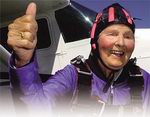 When Myrtle Pearse decides to celebrate her advancing years, the sky's the limit.
When Myrtle Pearse decides to celebrate her advancing years, the sky's the limit.
In February the Dunedin great grandmother marked her 90th birthday by doing a tandem parachute jump from 2750 metres above the southern city – and raising $1000 for Otago Community Hospice in the process.
Myrtle the Turtle, as family and friends affectionately call her, says she wasn't nervous beforehand. She did a similar leap when she was 85 – and may do another when she's 95.
Her February feat, watched by her 93- year-old sister from England, Mavis Airey, marked her as probably the oldest woman in New Zealand to make a parachute jump.
But Myrtle didn't rest on her laurels. She immediately set about organising a golden oldies team for a 24-hour Relay for Life to raise funds for the Cancer Society.
Myrtle's no stranger to twilight-years achievement. At the 2004 NZ Masters Games in Dunedin she celebrated her 87th birthday by winning the 50-metre celebrity swim and taking silver in her age-group in the 10km walk.
Myrtle normally swims in a pool three times a week and walks twice a day for up to an hour on St Clair beach.
She doesn't know whether she'll attempt further remarkable exploits. "I haven't got a clue," she says.
She gives an identical reply when asked why she takes up rigorous challenges at an age when most people would be content to sit back and relax.
So does she just follow her heart when such challenges suggest themselves? "That's right," Myrtle says.
When it's suggested her get-up-and-go spirit sets an example to senior citizens everywhere, she replies: "Well, if I can do that, it's something."
She adds: "When you get older it's no good sitting down and saying, 'That's it'. You've got to have new challenges along the way."
Midlife pointers to a long life
There are nine midlife health-risk factors which considerably limit a person's chances of living to a great age, according to a United States medical report.
If none of the factors are present in midlife, a person has a 70 per cent chance of living to 85. The factors are:
* Being overweight (body-mass index of 25 or more).
* Having high blood-glucose levels, which can lead to diabetes.
* Having high triglicyeride levels, which contribute to heart disease.
* Having high blood pressure.
* Having low grip strength – unable to squeeze at least 86 pounds (39kg) of pressure with a hand-held device.
* Smoking.
* Consuming three or more alcoholic drinks a day.
* Not graduating from secondary school.
* Being unmarried.









Join the Discussion
Type out your comment here:
You must be logged in to post a comment.